#cameron canada
Text
Greenwashing set Canada on fire
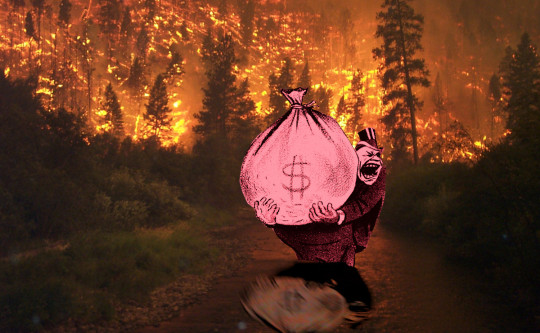
On September 22, I'm (virtually) presenting at the DIG Festival in Modena, Italy. On September 27, I'll be at Chevalier's Books in Los Angeles with Brian Merchant for a joint launch for my new book The Internet Con and his new book, Blood in the Machine.

As a teenager growing up in Ontario, I always envied the kids who spent their summers tree planting; they'd come back from the bush in September, insect-chewed and leathery, with new muscle, incredible stories, thousands of dollars, and a glow imparted by the knowledge that they'd made a new forest with their own blistered hands.
I was too unathletic to follow them into the bush, but I spent my summers doing my bit, ringing doorbells for Greenpeace to get my neighbours fired up about the Canadian pulp-and-paper industry, which wasn't merely clear-cutting our old-growth forests – it was also poisoning the Great Lakes system with PCBs, threatening us all.
At the time, I thought of tree-planting as a small victory – sure, our homegrown, rapacious, extractive industry was able to pollute with impunity, but at least the government had reined them in on forests, forcing them to pay my pals to spend their summers replacing the forests they'd fed into their mills.
I was wrong. Last summer's Canadian wildfires blanketed the whole east coast and midwest in choking smoke as millions of trees burned and millions of tons of CO2 were sent into the atmosphere. Those wildfires weren't just an effect of the climate emergency: they were made far worse by all those trees planted by my pals in the eighties and nineties.
Writing in the New York Times, novelist Claire Cameron describes her own teen years working in the bush, planting row after row of black spruces, precisely spaced at six-foot intervals:
https://www.nytimes.com/2023/09/15/opinion/wildfires-treeplanting-timebomb.html
Cameron's summer job was funded by the logging industry, whose self-pegulated, self-assigned "penalty" for clearcutting diverse forests of spruce, pine and aspen was to pay teenagers to create a tree farm, at nine cents per sapling (minus camp costs).
Black spruces are made to burn, filled with flammable sap and equipped with resin-filled cones that rely on fire, only opening and dropping seeds when they're heated. They're so flammable that firefighters call them "gas on a stick."
Cameron and her friends planted under brutal conditions: working long hours in blowlamp heat and dripping wet bulb humidity, amidst clouds of stinging insects, fingers blistered and muscles aching. But when they hit rock bottom and were ready to quit, they'd encourage one another with a rallying cry: "Let's go make a forest!"
Planting neat rows of black spruces was great for the logging industry: the even spacing guaranteed that when the trees matured, they could be easily reaped, with ample space between each near-identical tree for massive shears to operate. But that same monocropped, evenly spaced "forest" was also optimized to burn.
It burned.
The climate emergency's frequent droughts turn black spruces into "something closer to a blowtorch." The "pines in lines" approach to reforesting was an act of sabotage, not remediation. Black spruces are thirsty, and they absorb the water that moss needs to thrive, producing "kindling in the place of fire retardant."
Cameron's column concludes with this heartbreaking line: "Now when I think of that summer, I don’t think that I was planting trees at all. I was planting thousands of blowtorches a day."
The logging industry committed a triple crime. First, they stole our old-growth forests. Next, they (literally) planted a time-bomb across Ontario's north. Finally, they stole the idealism of people who genuinely cared about the environment. They taught a generation that resistance is futile, that anything you do to make a better future is a scam, and you're a sucker for falling for it. They planted nihilism with every tree.
That scam never ended. Today, we're sold carbon offsets, a modern Papal indulgence. We are told that if we pay the finance sector, they can absolve us for our climate sins. Carbon offsets are a scam, a market for lemons. The "offset" you buy might be a generated by a fake charity like the Nature Conservancy, who use well-intentioned donations to buy up wildlife reserves that can't be logged, which are then converted into carbon credits by promising not to log them:
https://pluralistic.net/2020/12/12/fairy-use-tale/#greenwashing
The credit-card company that promises to plant trees every time you use your card? They combine false promises, deceptive advertising, and legal threats against critics to convince you that you're saving the planet by shopping:
https://pluralistic.net/2021/11/17/do-well-do-good-do-nothing/#greenwashing
The carbon offset world is full of scams. The carbon offset that made the thing you bought into a "net zero" product? It might be a forest that already burned:
https://pluralistic.net/2022/03/11/a-market-for-flaming-lemons/#money-for-nothing
The only reason we have carbon offsets is that market cultists have spent forty years convincing us that actual regulation is impossible. In the neoliberal learned helplessness mind-palace, there's no way to simply say, "You may not log old-growth forests." Rather, we have to say, "We will 'align your incentives' by making you replace those forests."
The Climate Ad Project's "Murder Offsets" video deftly punctures this bubble. In it, a detective points his finger at the man who committed the locked-room murder in the isolated mansion. The murderer cheerfully admits that he did it, but produces a "murder offset," which allowed him to pay someone else not to commit a murder, using market-based price-discovery mechanisms to put a dollar-figure on the true worth of a murder, which he duly paid, making his kill absolutely fine:
https://pluralistic.net/2021/04/14/for-sale-green-indulgences/#killer-analogy
What's the alternative to murder offsets/carbon credits? We could ask our expert regulators to decide which carbon intensive activities are necessary and which ones aren't, and ban the unnecessary ones. We could ask those regulators to devise remediation programs that actually work. After all, there are plenty of forests that have already been clearcut, plenty that have burned. It would be nice to know how we can plant new forests there that aren't "thousands of blowtorches."
If that sounds implausible to you, then you've gotten trapped in the neoliberal mind-palace.
The term "regulatory capture" was popularized by far-right Chicago School economists who were promoting "public choice theory." In their telling, regulatory capture is inevitable, because companies will spend whatever it takes to get the government to pass laws making what they do legal, and making competing with them into a crime:
https://pluralistic.net/2022/06/13/public-choice/#ajit-pai-still-terrible
This is true, as far as it goes. Capitalists hate capitalism, and if an "entrepreneur" can make it illegal to compete with him, he will. But while this is a reasonable starting-point, the place that Public Choice Theory weirdos get to next is bonkers. They say that since corporations will always seek to capture their regulators, we should abolish regulators.
They say that it's impossible for good regulations to exist, and therefore the only regulation that is even possible is to let businesses do whatever they want and wait for the invisible hand to sweep away the bad companies. Rather than creating hand-washing rules for restaurant kitchens, we should let restaurateurs decide whether it's economically rational to make us shit ourselves to death. The ones that choose poorly will get bad online reviews and people will "vote with their dollars" for the good restaurants.
And if the online review site decides to sell "reputation management" to restaurants that get bad reviews? Well, soon the public will learn that the review site can't be trusted and they'll take their business elsewhere. No regulation needed! Unleash the innovators! Set the job-creators free!
This is the Ur-nihilism from which all the other nihilism springs. It contends that the regulations we have – the ones that keep our buildings from falling down on our heads, that keep our groceries from poisoning us, that keep our cars from exploding on impact – are either illusory, or perhaps the forgotten art of a lost civilization. Making good regulations is like embalming Pharaohs, something the ancients practiced in mist-shrouded, unrecoverable antiquity – and that may not have happened at all.
Regulation is corruptible, but it need not be corrupt. Regulation, like science, is a process of neutrally adjudicated, adversarial peer-review. In a robust regulatory process, multiple parties respond to a fact-intensive question – "what alloys and other properties make a reinforced steel joist structurally sound?" – with a mix of robust evidence and self-serving bullshit and then proceed to sort the two by pantsing each other, pointing out one another's lies.
The regulator, an independent expert with no conflicts of interest, sorts through the claims and counterclaims and makes a rule, showing their workings and leaving the door open to revisiting the rule based on new evidence or challenges to the evidence presented.
But when an industry becomes concentrated, it becomes unregulatable. 100 small and medium-sized companies will squabble. They'll struggle to come up with a common lie. There will always be defectors in their midst. Their conduct will be legible to external experts, who will be able to spot the self-serving BS.
But let that industry dwindle to a handful of giant companies, let them shrink to a number that will fit around a boardroom table, and they will sit down at a table and agree on a cozy arrangement that fucks us all over to their benefit. They will become so inbred that the only people who understand how they work will be their own insiders, and so top regulators will be drawn from their own number and be hopelessly conflicted.
When the corporate sector takes over, regulatory capture is inevitable. But corporate takeover isn't inevitable. We can – and have, and will again – fight corporate power, with antitrust law, with unions, and with consumer rights groups. Knowing things is possible. It simply requires that we keep the entities that profit by our confusion poor and thus weak.
The thing is, corporations don't always lie about regulations. Take the fight over working encryption, which – once again – the UK government is trying to ban:
https://www.theguardian.com/technology/2023/feb/24/signal-app-warns-it-will-quit-uk-if-law-weakens-end-to-end-encryption
Advocates for criminalising working encryption insist that the claims that this is impossible are the same kind of self-serving nonsense as claims that banning clearcutting of old-growth forests is impossible:
https://twitter.com/JimBethell/status/1699339739042599276
They say that when technologists say, "We can't make an encryption system that keeps bad guys out but lets good guys in," that they are being lazy and unimaginative. "I have faith in you geeks," they said. "Go nerd harder! You'll figure it out."
Google and Apple and Meta say that selectively breakable encryption is impossible. But they also claim that a bunch of eminently possible things are impossible. Apple claims that it's impossible to have a secure device where you get to decide which software you want to use and where publishers aren't deprive of 30 cents on every dollar you spend. Google says it's impossible to search the web without being comprehensively, nonconsensually spied upon from asshole to appetite. Meta insists that it's impossible to have digital social relationship without having your friendships surveilled and commodified.
While they're not lying about encryption, they are lying about these other things, and sorting out the lies from the truth is the job of regulators, but that job is nearly impossible thanks to the fact that everyone who runs a large online service tells the same lies – and the regulators themselves are alumni of the industry's upper eschelons.
Logging companies know a lot about forests. When we ask, "What is the best way to remediate our forests," the companies may well have useful things to say. But those useful things will be mixed with actively harmful lies. The carefully cultivated incompetence of our regulators means that they can't tell the difference.
Conspiratorialism is characterized as a problem of what people believe, but the true roots of conspiracy belief isn't what we believe, it's how we decide what to believe. It's not beliefs, it's epistemology.
Because most of us aren't qualified to sort good reforesting programs from bad ones. And even if we are, we're probably not also well-versed enough in cryptography to sort credible claims about encryption from wishful thinking. And even if we're capable of making that determination, we're not experts in food hygiene or structural engineering.
Daily life in the 21st century means resolving a thousand life-or-death technical questions every day. Our regulators – corrupted by literally out-of-control corporations – are no longer reliable sources of ground truth on these questions. The resulting epistemological chaos is a cancer that gnaws away at our resolve to do anything about it. It is a festering pool where nihilism outbreaks are incubated.
The liberal response to conspiratorialism is mockery. In her new book Doppelganger, Naomi Klein tells of how right-wing surveillance fearmongering about QR-code "vaccine passports" was dismissed with a glib, "Wait until they hear about cellphones!"
https://pluralistic.net/2023/09/05/not-that-naomi/#if-the-naomi-be-klein-youre-doing-just-fine
But as Klein points out, it's not good that our cellphones invade our privacy in the way that right-wing conspiracists thought that vaccine passports might. The nihilism of liberalism – which insists that things can't be changed except through market "solutions" – leads us to despair.
By contrast, leftism – a muscular belief in democratic, publicly run planning and action – offers a tonic to nihilism. We don't have to let logging companies decide whether a forest can be cut, or what should be planted when it is. We can have nice things. The art of finding out what's true or prudent didn't die with the Reagan Revolution (or the discount Canadian version, the Mulroney Malaise). The truth is knowable. Doing stuff is possible. Things don't have to be on fire.



If you'd like an essay-formatted version of this post to read or share, here's a link to it on pluralistic.net, my surveillance-free, ad-free, tracker-free blog:
https://pluralistic.net/2023/09/16/murder-offsets/#pulped-and-papered
#pluralistic#logging#pulp and paper#ontario#greenwashing#a market for lemons#incentives matter#capitalism#late-stage capitalism#climate emergency#wildfires#canada#canpoli#ontpoli#carbon offsets#self-regulation#nerd harder#epistemological chaos#regulatory capture#Claire Cameron#pines in lines
3K notes
·
View notes
Text


#News#politics#star wars#free palestine#israel#war crimes#world central kitchen#democrats#republicans#britain#david cameron#usa#uk#twitter#woc#canada#poland#australia
535 notes
·
View notes
Text
how does tumblr work here’s venture (they’re like 21…. They should be in the club!!)

#overwatch#overwatch art#overwatch venture#venture overwatch#venture ow2#sloan cameron#ow2 fanart#ow2#ow2 venture#club#clubbing#clubbing art#club art#nonbinary#non biney#canada#Canadian character#canadian#sketchbook#drawing#illustration#manga#tooberbatch
65 notes
·
View notes
Text

very important please see the vision !!
#total drama#total drama fanart#td#td gwen#td cameron#td owen#td cody#my art#please see the gwen and owen sibling dynamic#pretty pleaseee#cameron the littlest man in all of canada#he is drowning in his sweatshirt </3
140 notes
·
View notes
Text
Two Alberta lawyers charged with attempting to obstruct justice have been banned from practising law anywhere in Canada for three years as part of a plea deal with Manitoba prosecutors that saw their charges stayed.
Randal Jay Cameron and John Carpay were also charged with intimidation of a justice system participant after they hired a private investigator to follow the Manitoba judge who presided over their case challenging COVID-19 restrictions in 2021.
Full article
Tagging: @politicsofcanada
#cdnpoli#canada#canadian politics#canadian news#canadian#randal jay cameron#john carpay#obstruction of justice#intimidation#coronavirus restrictions#COVID-19 restrictions#alberta#manitoba
66 notes
·
View notes
Text



what a bloody phenominal weekend! an absolute core memory and a day i will never, ever forget
neil newbon has been one of my acting idols for over 10 years now, this was a dream come true to meet him this weekend. he was such a sweetheart, i am still reeling over the fact he remembered who i was from ordering prints in the past and the fact that he gave me hugs and a full conversation for a few minutes
i cant wait to do this all again next year!
#fan expo#fan expo canada#neil newbon#cameron monaghan#brandon rogers#astarion#baldurs gate 3#helluva boss#hazbin hotel#jinx#arcane#jinx cosplay#best day of my entire life#core memory
34 notes
·
View notes
Text










the 2022 draft boys talking about hockey cards + shane wright struggling to open a pack. (via sportsnet)
#jack hughes#brad lambert#noah warren#issac howard#shane wright#logan cooley#conor geekie#matt savoie#cameron lund#hockey boys#hockey#hockey gif#hockey gifs#ntdp boys#team canada#bad quality but good quality boys <3#nhl draft 2022#nhl draft
103 notes
·
View notes
Text

The Statue of Liberty in New York is covered in haze and smoke caused by wildfires in Canada. Photograph: Amr Alfiky/Reuters
New York Mayor On Smoky Haze: 'Climate Change Accelerated These Conditions'
With New York City being ranked briefly this morning as the city with the world’s worst air pollution, mayor Eric Adams warned that climate change has accelerated the conditions surrounding the smokey haze that has shrouded the city.
“While this may be the first time we’ve experienced something like this on this magnitude...it is not the last. Climate change accelerated these conditions.”
Adams went on to urge for more action towards addressing climate change issues, saying:
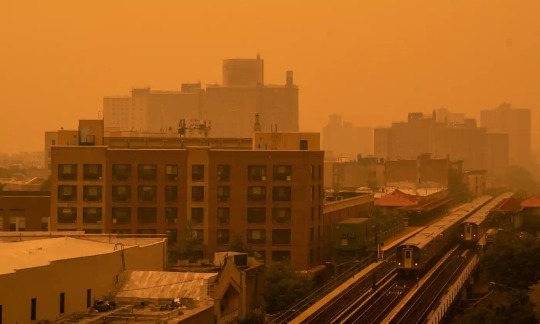
Skies in the Bronx neighborhood. Photograph: David Dee Delgado/Getty Images
“New York City is clearly a national leader on public health and climate action and these dangerous air quality conditions are clearly an urgent reminder that we must act now to protect our city, our environment and the future of our children.”
Vermont senator Bernie Sanders and echoed similar sentiments towards climate change on Wednesday, tweeting:
“Right now, 98 MILLION people on the East Coast are under air quality alerts from Canadian fires and, last night, NYC had the worst air quality in the world. Climate change makes wildfires more frequent and widespread. If we do nothing, this is our new reality. It’s time to act.”
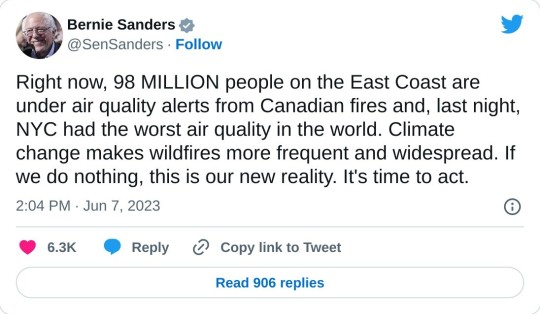
Meanwhile, during a press briefing this afternoon, White House press secretary Karine Jean-Pierre said that “climate change [is] a top priority” as tens of millions of Americans remain under air quality alerts.
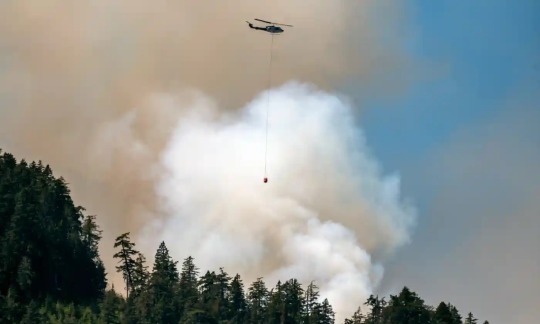
A helicopter waterbomber flies above the Cameron Bluffs wildfire near Port Alberni, British Columbia, Canada, on Monday, June 5, 2023. Canada is on track to see its worst-ever wildfire season in recorded history if the rate of land burned continues at the same pace. Photograph: Bloomberg/Getty Images
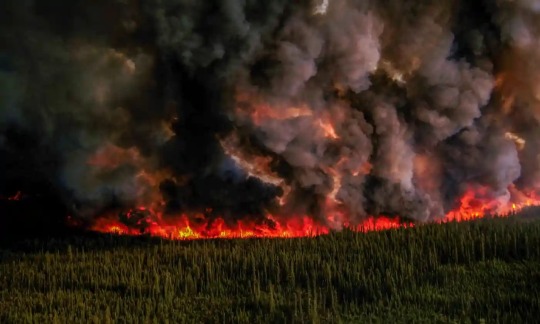
Smoke billows upwards from a planned ignition by firefighters tackling the Donnie Creek Complex wildfire south of Fort Nelson, British Columbia, Canada June 3, 2023. Photograph: BC Wildfire Service/Reuters
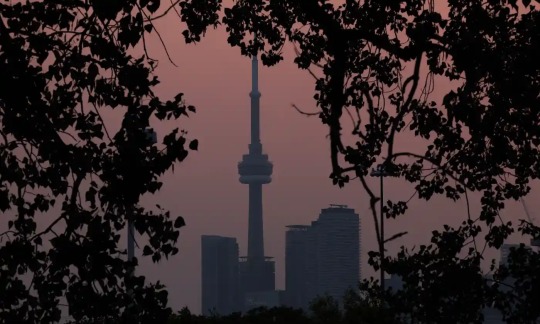
Smoke from forest fires in Northern Ontario and in Quebec contribute to pink hazy sunset in the city from the Cherry Beach over Toronto. June 6, 2023. Photograph: Steve Russell/Toronto Star/Getty Images

In this GOES-16 GeoColor and fire temperature satellite image taken Tuesday, June 6, 2023 at 6:40 p.m. EDT and provided by CIRA/NOAA, smoke from wildfires burning in the Canadian Provinces of Quebec, center, and Ontario, left, drift southward. Photograph: AP

A man wears a face mask as smoke continues to shroud the sun as it rises behind the skyline of Manhattan in New York City on June 7, 2023, as seen from Weehawken, New Jersey. Photograph: VIEW press/Corbis/Getty Images

People attend a morning yoga class on The Edge observation deck as a haze caused by smoke from wildfires burning in Canada hangs over Manhattan in New York, USA, 07 June 2023. Photograph: Justin Lane/EPA
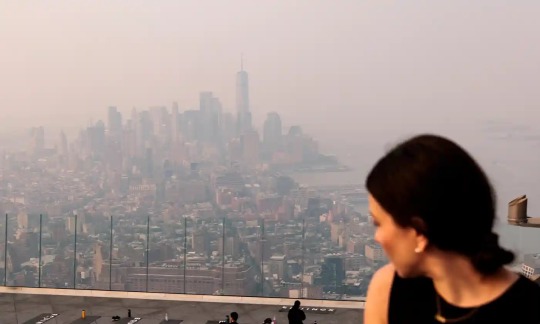
A woman looks at the Manhattan skyline engulfed in haze caused by smoke from wildfires burning in Canada, in New York, USA, 07 June 2023. Photograph: Justin Lane/EPA
9 notes
·
View notes
Text



This was way too funny
Degrassi: The Next Generation

#jt yorke#Degrassi#degrassi the next generation#Canada#emma nelson#miriam mcdonald#manny santos#cassie steele#toby isaacs#sean cameron
42 notes
·
View notes
Photo

Two Highland gentlemen before the dinner.
#queens own cameron highlanders#argylls#argyll and sutherland highlanders of canada#a&shofc#reserves#hamilton#winnipeg#mess kit#mess dress#tartan#kilt#men in kilts#trews#scotch
3 notes
·
View notes
Text

Line 'em up. 🇨🇦
#CARSON AS THE EXTRA D MAKES ME SO SAD#I HATE DAVE CAMERON SO MUCH#team canada#hockey canada#wjc lb#wjc 22
22 notes
·
View notes
Text
i'd say something about dave cameron's awful lines but i'm geniunely speechless about them
2 notes
·
View notes
Text
Welcome to TheNFB's Hothouse 14! Showcase is Online.
The National Film Board of Canada’s Hothouse animation apprenticeship program is a great way to see emerging talents showcase their visual design skills. It’s sometimes less about the stories presented and at other times more about what an individual can do within a medium that’s sometimes challenging to use to tell a story. What I find engaging is what each person can dream up.
Sometimes it’s…

View On WordPress
#Akash Jones#Animation#Bianca Shonee Arroyo-Kreimes#Cameron Kletke#Hothouse#Jenny Yujia Shi#Michele Ku#Mochi Lin#National Film Board of Canada
0 notes
Text
Exploring the Legacy of the Toronto Maple Leafs

The Toronto Maple Leafs stand as an iconic symbol not only within the realm of ice hockey but also in the cultural fabric of Canada. Founded in 1917, this storied franchise has left an indelible mark on the sport and the city of Toronto itself.
With a rich history spanning over a century, the Maple Leafs have garnered an unparalleled devotion from fans across generations. From the glory days of the Original Six era to the modern NHL landscape, the team's legacy is etched in the hearts of millions.
At the heart of the Maple Leafs' legacy are their numerous championships, including 13 Stanley Cup victories. The names of legends like Dave Keon, Darryl Sittler, and Mats Sundin resonate through the annals of hockey history, immortalized for their contributions to the team's success.

Yet, the journey of the Maple Leafs hasn't been without its challenges. Despite enduring periods of drought, their loyal fan base remains unwavering, filling the seats of the iconic Scotiabank Arena with a sea of blue and white jerseys every game night.
Beyond the ice, the Maple Leafs serve as ambassadors for the city of Toronto, embodying its resilience, diversity, and passion. Their impact extends far beyond sports, uniting communities and inspiring future generations to chase their dreams relentlessly.

As the Toronto Maple Leafs continue to chase glory on the ice, their legacy remains firmly entrenched in the hearts of fans worldwide. With each game, each goal, and each triumph, they continue to write new chapters in the illustrious history of one of hockey's most revered franchises.
#toronto maple leafs#maple leafs#maple leaves#john tavares#liya silver#liya samsonov#canada#quebec#nova scotia#ontario#texas#candace cameron bure
0 notes
Text
"After a long, largely fulfilling career at Air Canada, the airline’s first woman pilot recalls the struggles she faced as a trailblazer and the efforts still needed to encourage more young women to enter aviation."
0 notes
